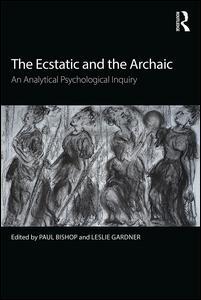The Ecstatic and the Archaic An Analytical Psychological Inquiry
Coordonnateurs : Bishop Paul, Gardner Leslie

The word ?archaic? derives from the Greek arkhaios, which in turn is related to the word arch?, meaning ?principle?, ?origin?, or ?cause?; the notion of ecstasy, or ekstasis,implies standing outside or beyond oneself, a self-transcendence. How these two concepts are articulated and co-implicated constitutes the core question underlying this edited collection, which examines both the present day and antiquity in order to trace the insistent presence of the ecstatic amid the archaic.
Presented in three parts, the contributors to this diverse book take the concept of the archaic in an entirely new direction. Part I, 'Ecstasy and the psychological', covers topics including Jung, Freud, ancient psychotherapy, desire, and theatre. Part II, 'Ecstatic-archaic history', considers Ludwig Klages, Orestes and Dionysus. Finally, Part III, 'Ancient ecstatic in other worlds', examines Luo Guanzhong?s Three Kingdoms and Enki at Eridu. The collection offers a distinctive contextualisation of the dimension of the archaic in relation to the ecstatic experience.
The Ecstatic and the Archaic will appeal to readers interested in the relationship between ancient and postmodern worlds, and in how the past manifests itself in the present. It will be of great interest to academics and students of Jungian and post-Jungian ideas, classical religions and the history of ideas, as well as practitioners of analytical psychology and psychoanalysis.
Contributors; Preface, Leslie Gardner; Introduction, Paul Bishop; Part I: ECSTASY AND THE PSYCHOLOGICAL, 1. The stream of desire and Jung’s concept of psychic energy, Raya A. Jones; 2. The characters speak because they want to speak: Jung, Dionysus, theatre, and therapy, Mark Saban; 3. Ancient psychotherapy? Fifth-century BCE Athenian intellectuals and the cure of disturbed minds, Yulia Ustinova; 4. Antiquity and anxiety: Freud, Jung, and the impossibility of the archaic, Alan Cardew; Part II: ECSTATIC-ARCHAIC HISTORY, 5. I must get out (of myself) more often? Jung, Klages, and the ecstatic-archaic, Paul Bishop; 6. Ecstatic atoms: The question of Oresteian individuation, Ben Pestell; 7. Monetised psyche and Dionysiac ecstasy, Richard Seaford; Part III: ANCIENT ECSTATIC IN OTHER WORLDS, 8. History, philosophy, and myth in Luo Guanzhong’s Three Kingdoms, Terence Dawson; 9. Enki at Eridu: God of directed thinking, Catriona Miller; Index
Paul Bishop is William Jacks Chair of Modern Languages at the University of Glasgow, UK. His previous publications include On the Blissful Islands, Analytical Psychology and German Classical Aesthetics, volumes one and two, and, as editor, The Archaic: The Past in the Present and Jung in Contexts: A Reader (all Routledge).
Leslie Gardner is Fellow at the Department of Psychosocial Studies, University of Essex, UK, and author of Rhetorical Investigations: G.B. Vico and C.G. Jung and co-editor of House: The Wounded Healer on Television (both Routledge). Gardner co-founded the International Association of Jungian Studies and established the International Journal of Jungian Studies.
Date de parution : 03-2018
15.6x23.4 cm
Date de parution : 03-2018
15.6x23.4 cm
Thème de The Ecstatic and the Archaic :
Mots-clés :
Zhang Fei; ecstatic; Wandlungen Und Symbole Der Libido; archaic; Dong Zhuo; analytical; Dionysiac Ecstasy; psychological; Acheronta Movebo; bishop; Ecstatic Dimension; gardner; Sonu Shamdasani; inquiry; Luo Guanzhong; Raya A; Jones; Mysterium Coniunctionis; Mark Saban; Liu Bei; Yulia Ustinova; Young Man; Alan Cardew; Schiller’s Ballad; Ben Pestell; Mental Ailments; Richard Seaford; La Princesse De; Terence Dawson; Grape Vine; Catriona Miller; Sumerian Pantheon; Ecstatic Manifestation; Jung’s Red Book; Charcot; Jean Martin Charcot; Zhu Xi; Ecstatic Rites; God Enki; Tragic Flaw; Sacrificium Intellectus



